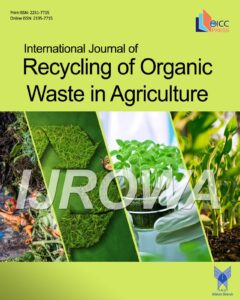The study of plant growth promoter production from leather industrial solid waste
Authors
- John Sundar * 1
Abstract
Purpose The leather industry produces huge quantities of proteinous solid wastes and is being dumped or improperly utilized resulting in economical losses or causing an environmental problem. An efficient, low-cost procedure was developed to convert animal fleshings into plant growth promoters (PGP).
Method The fleshings were hydrolyzed and analyzed for moisture, fat, ash, and nitrogen contents. The protein hydrolysate is incorporated with phosphorous and potassium in a suitable method to convert into plant growth promoters. The obtained product is characterized and field application studies have been conducted with ladyfinger plants (Abelmoschus esculentus).
Results The detailed characterization of PGPs through physicochemical analyses gave a deeper understanding of microstructures. Spectroscopic features and FT-IR studies confirmed the potential of PGP. The bio-metric results have shown that the application of plant growth promoter yielded better results and chemical characteristics.
Conclusion Hence this study provided a viable solution for the conversion of proteinous solid wastes into plant growth promoters.
Highlights
- Liquid and solids wastes are the main concerns of the leather industry
- Hydrolyzed protein from solid wastes was positive for plant growth-promoting activities
- Phosphorous and Potassium are incorporated for added advantage
- Enhancement of beneficial soil microorganisms
- No harmful effect on human health and the environment



